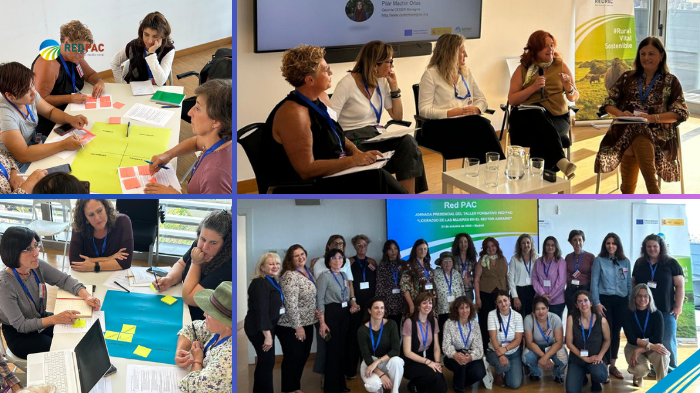
28 de October de 2025
Dinamización rural
Mujeres
Resiliencia y competitividad
Madrid hosted an in-person session that brought the virtual training workshop “Women’s Leadership in the Agricultural Sector” to a close.
- Madrid hosted an in-person session that brought the virtual training workshop “Women’s Leadership in the Agricultural Sector” to a close.
- The meeting brought together leading women and professionals from the agricultural sector to strengthen their presence in decision-making bodies
During September and October, the CAP Network organized the training workshop “Women’s Leadership in the Agricultural Sector” , with the purpose of promoting gender equality and the active participation of women in the decision-making bodies of the agricultural sector, contributing to greater inclusivity and in harmony with the environment.
As a culmination of the workshop, the Ministry of Agriculture, Fisheries and Food (MAPA) headquarters on Gran Vía de San Francisco in Madrid hosted the in-person meeting that concluded the course. This event brought together participants from the online sessions and various representatives from the sector who shared experiences, lessons learned, and strategies for continuing to advance towards greater equity in agricultural decision-making.
The workshop took place between September 23 and October 21 and consisted of five modules in a mixed format aimed at enhancing the leadership, communication and negotiation skills of female farmers and ranchers.
Training workshop
In the weeks leading up to the final session, 40 students participated in the training workshop “Women’s Leadership in the Agricultural Sector ,” a nationwide initiative that combined theoretical and practical sessions in an online format. Across four modules, the participants worked on content designed to strengthen their leadership, communication, and negotiation skills.
The first module addressed the participation of women in the agricultural sector and the challenges of their representation in decision-making bodies, highlighting the structural biases that hinder their access.
The second module focused on conscious communication and personal leadership, promoting self-confidence, active listening, and empathetic decision-making.
In the third module , the students learned positive conflict management strategies and mediation techniques adapted to the rural environment.
The fourth module dealt with effective meetings and collaborative negotiation, offering practical tools to promote more active and equitable participation in agrarian structures.
These contents laid the foundation for the face-to-face session held in Madrid, the fifth module , which served as the closing of the training process.
In-person session
From the beginning of the training, the high participation of the workshop has been highlighted, which has included female farmers and livestock breeders from all over Spain interested in taking a more active role in the agricultural entities to which they belong, such as cooperatives or professional organizations, and occupying traditionally male-dominated spaces.
The central focus of the meeting was the round table discussion on female leadership and decision-making bodies, moderated by Pilar Machín , manager of CEDER Monegros , a collaborating organization in the training. Four leading women participated, sharing their experiences and perspectives on the challenges of female participation in the agricultural sector:
Jerónima Bonafé , president of the Balearic Islands Agri-food Cooperatives and vice-president of the Spanish Business Confederation of the Social Economy (CEPES) , emphasized the importance of incorporating equality as a cross-cutting principle in cooperative management and agri-food policies. She also highlighted the need to strengthen generational renewal, encouraging young women to pursue training and development to lead the sector's future.
Mariló Corral, president of the La Esperanza del Campo cooperative (Granada), explained how shared leadership and innovation can transform rural cooperatives into engines of local development, especially when women assume management responsibilities.
Valentina Cabra, president of the Regulatory Council of the Protected Designation of Origin (PDO) of La Mancha Saffron , recounted her experience as the first woman to head this regulatory council, emphasizing the value of technical knowledge and intergenerational collaboration.
Eva Lafraya, general secretary of the Union of Small Farmers and Ranchers (UPA) of La Rioja, contributed her vision from the defense of the fruit sector and union representation, recalling the need to strengthen the female presence in agricultural professional structures.
The round table concluded with a question and answer session in which the attendees shared their concerns and proposals to continue moving towards a fairer and more balanced representation at all decision-making levels.
Dynamic
Following the roundtable discussion, the participants engaged in a practical activity coordinated by Isabel Ortega Sánchez , the workshop facilitator and a specialist in gender perspective. This activity allowed them to share the lessons learned and reflections that emerged during the training sessions, using a participatory approach that strengthened group cohesion and fostered support networks among the students—essential elements for the transformation of the sector.
The main ideas and proposals that emerged from this dynamic included, among others:
Need to establish a limit on the number of years of legislature - between 4 and 8 years - responding to the presence of men in management positions for, even, 16 consecutive years.
Adoption of regulations that facilitate gender equality in the composition of the boards of directors of the decision-making bodies of the agricultural sector.
Strengthening sisterhood : support among women in rural areas.
To promote and advise women who decide to run for leadership positions, helping to reduce the obstacles that hinder their participation.
With this event, the CAP Network concludes a training program that has brought together professionals from various autonomous communities, all with a common goal: to strengthen their leadership and participation in the future of the agricultural sector. The initiative reaffirms the CAP Network's commitment to gender equality, social justice, and the empowerment of rural women as key agents of agricultural development in Spain.









